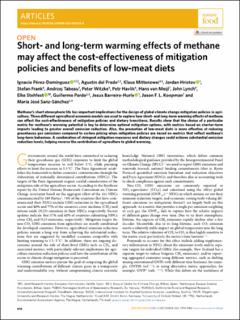Short- and long-term warming effects of methane may affect the cost-effectiveness of mitigation policies and benefits of low-meat diets
Pérez Domínguez, Ignacio; del Prado, Agustin; Mittenzwei, Klaus; Hristov, Jordan; Frank, Stefan; Tabeau, Andrzej; Witzke, Peter; Havlik, Petr; Lynch, John; Stehfest, Elke; Pardo, Guillermo; Barreiro-Hurle, Jesus; Koopman, Jason F.L.; Sanz-Sánchez, María José
Peer reviewed, Journal article
Published version
Permanent lenke
https://hdl.handle.net/11250/2979559Utgivelsesdato
2021Metadata
Vis full innførselSamlinger
- Artikler [231]
- Publikasjoner fra CRIStin [463]
Sammendrag
Methane’s short atmospheric life has important implications for the design of global climate change mitigation policies in agriculture. Three different agricultural economic models are used to explore how short- and long-term warming effects of methane can affect the cost-effectiveness of mitigation policies and dietary transitions. Results show that the choice of a particular metric for methane’s warming potential is key to determine optimal mitigation options, with metrics based on shorter-term impacts leading to greater overall emission reduction. Also, the promotion of low-meat diets is more effective at reducing greenhouse gas emissions compared to carbon pricing when mitigation policies are based on metrics that reflect methane’s long-term behaviour. A combination of stringent mitigation measures and dietary changes could achieve substantial emission reduction levels, helping reverse the contribution of agriculture to global warming.
